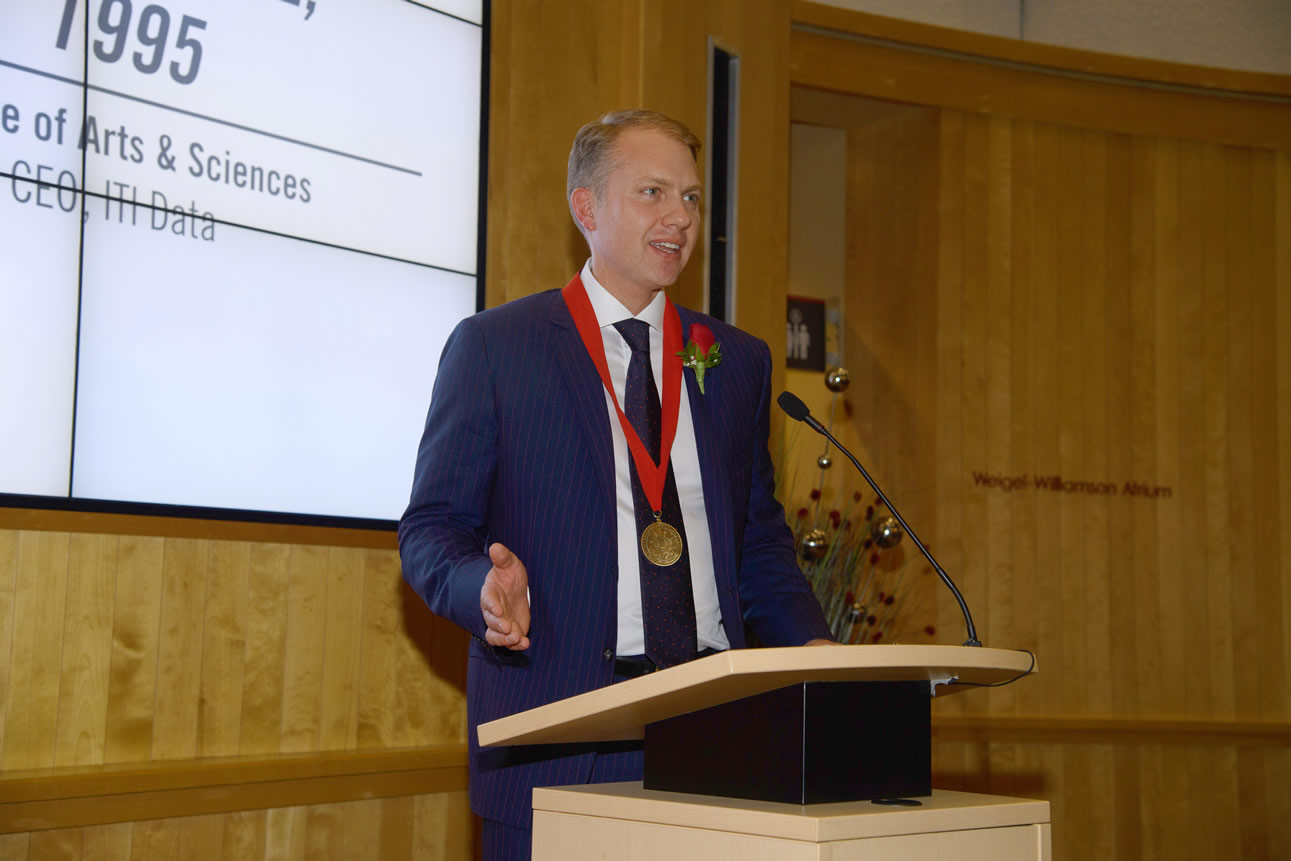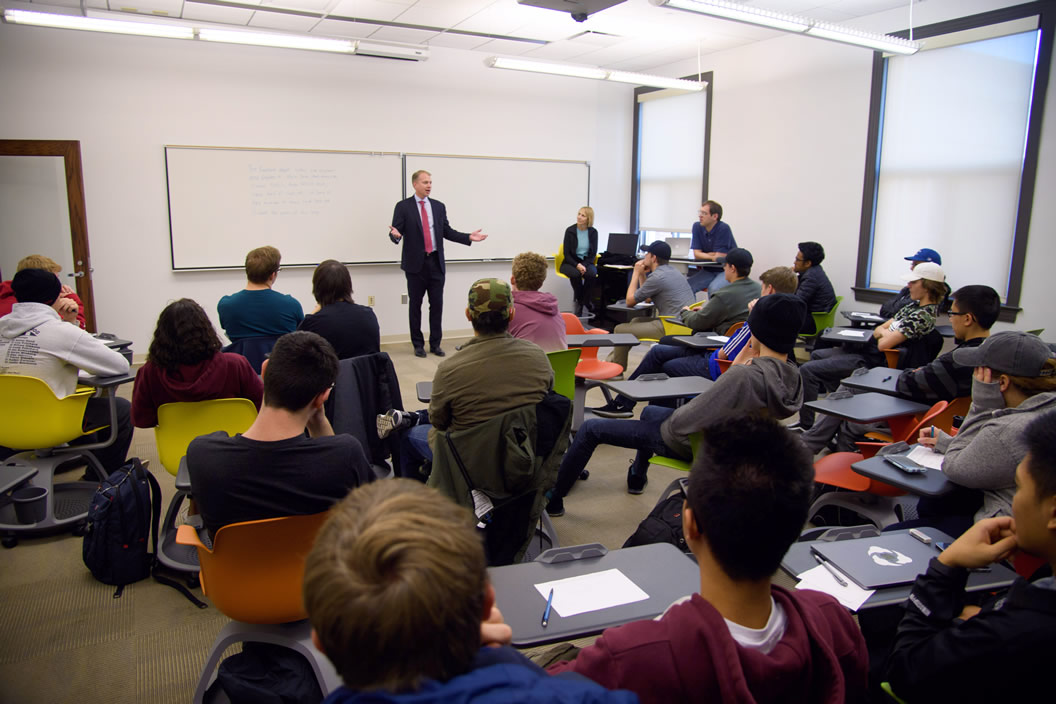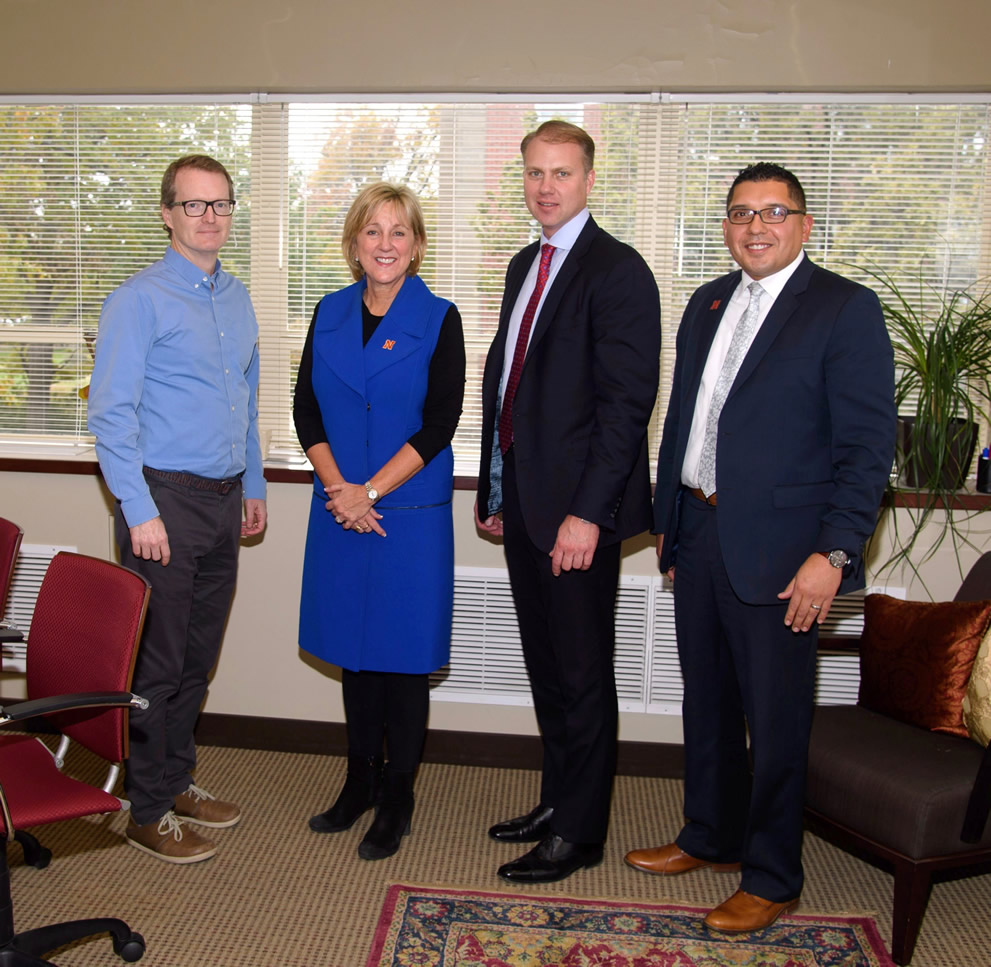Alumni profile: Brian Vaske
The Alumni Master talks about sharing his expertise with the Raikes School, starting a scholarship, and the value of his experiences at Nebraska.

Brian Vaske, CEO of ITI Data, reflects on his experiences at the University of Nebraska-Lincoln after accepting the 2017 Alumni Master Medallion.
Brian Vaske, who graduated from Nebraska in 1995 and founded information and data management company ITI Data in 1999, returned in early November for Alumni Master’s Week.
Alumni who have shown great promise, success, and leadership are recognized with the title “Alumni Master” and invited to return to campus to share experiences and knowledge with students.
The honor was a surprise to Vaske, whose company has grown to over 300 employees worldwide and counts Citibank, JP Morgan Chase, and Wells Fargo as clients.
“It was totally unexpected,” he said. “It was also a great way to reengage with the university.”
Back on campus, giving back
Vaske visited the Design Studio in the Jeffrey S. Raikes School of Computer Science and Management, offering his expertise to students and faculty. The studio uses an iterative process for problem solving and product development with real clients.
“I got to meet with a couple of different teams over there [and] talk through some of the problems and give them some ideas based off of my experience in the marketplace,” he said, “ [along with] technologies that they might look into to avoid reinventing the wheel to reach the qualification and completion of those projects.”
The Raikes School was established in 1999, four years after Vaske graduated, as a venture between the areas that represent Vaske’s major and minor—the Department of Computer Science and Engineering and the College of Business, respectively.
“[They are] actually being given some really hard problems to try to solve, and not just as an exercise but as a real set of deliverables with real companies,” he said. “That leads to more awareness and visibility of the capability and talent of the student base here.”
He also established a new scholarship for the Department of Computer Science and Engineering on behalf of his company through the University of Nebraska Foundation after consulting with department chair Matthew Dwyer and leaders at the Raikes School.
“We’ll be able to have a more well-established line of communication and familiarity with each other to talk about the kinds of things that we might be able to do together,” he said, “including internships and potentially collaboration on projects for the degree program, where we may be able to encourage some of our clients to engage in a senior project with the university.”
The university isn’t the first organization to benefit from Vaske’s generosity.
He serves on the board of directors for Only Make Believe, a non-profit that creates and performs interactive theater for terminally ill children. Vaske wanted an outlet to get involved in and do what he could do after overcoming cancer—he was diagnosed with Hodgkin’s Lymphoma during his freshman year and spent an extra semester recovering. These “Broadway shows in hospitals” give them an emotional escape, he said.
He also wanted to help other young adults connect with the same “thirst for knowledge about technology” he had growing up. Vaske was around the technology his father used as a federal agent, and he was in computer clubs in high school. His parents also bought him computers to fuel his “zest”. He serves on the Advisory Council for the NPower Technology Service Corps, a non-profit organization that provides training to underprivileged young adults pursuing IT careers.

Brian Vaske, CEO of ITI Data, returns to the University of Nebraska-Lincoln campus to share his experiences and knowledge with the undergraduate students of Computer Science and Engineering class.
An education beyond his field
Vaske understands the benefit of an education broader than the fields he works in.
“The purpose of a liberal arts degree is diversification of experience,” Vaske said, “so that you’re not just myopic about only one facet of life or the world.
“One of my favorite electives in my liberal arts program here was art history. Talk about completely off the path of computer science, math, or my minor in business. Another elective that I took a couple of different courses in was East Asian history, which it gave me a good perspective on and understanding of the makings and foundation of that culture.
“Those…really helped me, especially living in New York City, which is a very cultural and forward environment.”
He can relate well in both personal and professional situations, thanks to his educational experience. His company does business in places with strong Asian cultures, like Singapore, India, and Australia, and the history courses gave him the respect and understanding he needed to effectively work with them.
“I almost can’t imagine or understand why somebody wouldn’t want to have a liberal arts education,” Vaske said.
Vaske had his foreign language requirement met coming to the university, so he was able to devote credit hours exploring other fields, further broadening his education.
“If I’d continued into advanced Spanish, that could have been more helpful to me. But, on the other hand, because I had those extra free ten credit hours to work on sociology, psychology, political science, I was able to fill in and experience coursework in those areas. That was even more valuable to me.”
The faculty were incredible at taking the time to help him, Vaske recalls, especially Stephen Reichenbach, who was like a mentor, even arranging meetings with other faculty to help Vaske with difficult classes. This led Vaske to be an approachable executive who keeps an open door.
Outside of coursework, he had “an amazing professional opportunity” that further prepared him for his career.
Vaske was an undergraduate advisor for two years, one of a team of four students, each from a different discipline. He evaluated transcripts, making one-to-one matches with classes to help students get on the right course for their future career and use their money for college wisely. He learned accountability and conflict resolution while being in a professional environment.
It was its own kind of internship, he said. “I’ll never forget it.”

Matt Dwyer (Computer Science and Engineering Department Chair at UNL), Donde Plowman (Executive Vice Chancellor at UNL), Brian Vaske (CEO of ITI Data) and Victor Martinez (Nebraska Foundation)
Advice: foreign languages, internships, and being a Nebraskan
Despite being able to exchange foreign language credit hours for other coursework, Vaske says it’s more important than ever to learn another language. As his company does more work around the globe in places like Latin America, France, and Poland, he sees the need to spend more of his own time with other languages.
“It’s something that’s really important for students to focus on,” he said.
He also suggests pursuing internships, especially since there are more opportunities now than when he was in school.
“I wish I had had the opportunity to have more internships, whether it was locally or somewhere else in the country or even abroad. That’s a wonderful outlet. We actually have a small internship program, and we work with a number of clients that have large internship programs like Citibank and HSVC and others.”
The new scholarship established by his company for the university will likely provide internship opportunities, he said.
“I think the experience you get there gives you context for why what you’re studying will be important and relevant to your success after graduation. It also gives you a perspective of the political environment of corporate America and how it can be challenging to navigate that and preparing yourself with the professional and even diplomatic skills to be able to work effectively whether you’re a brand new hire or a manager or an executive.”
Finally, he says students can be confident in the Nebraska brand. You are just as intelligent and talented as the Ivy League graduates, and you can choose your attitude. Nebraska is special, and the move to the Big Ten helped that perception.
By Mike O’Connor